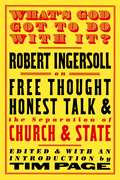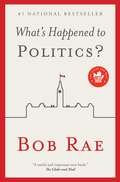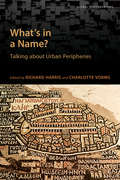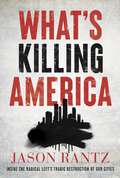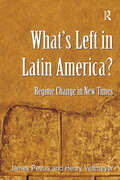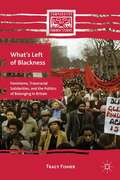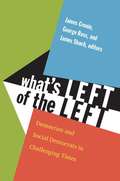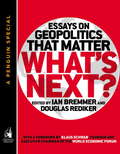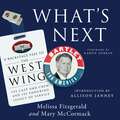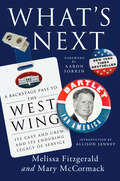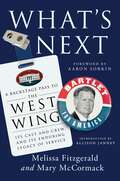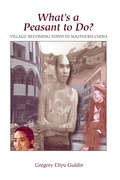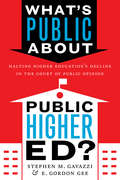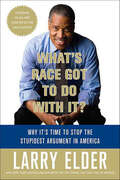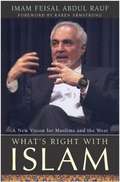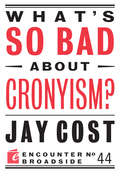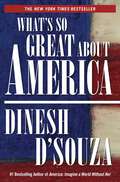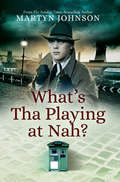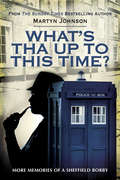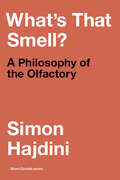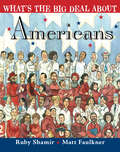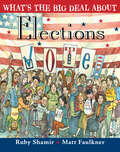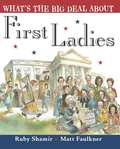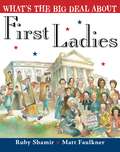- Table View
- List View
What's God Got to Do With It?: Robert Ingersoll on Free Thought, Honest Talk and the Separation of Church and State
by Tim PageRobert Ingersoll (1833—1899) is one of the great lost figures in United States history, all but forgotten at just the time America needs him most. An outspoken and unapologetic agnostic, fervent champion of the separation of church and state, and tireless advocate of the rights of women and African Americans, he drew enormous audiences in the late nineteenth century with his lectures on “freethought.” His admirers included Mark Twain and Thomas A. Edison, who said Ingersoll had “all the attributes of a perfect man” and went so far as to make an early recording of Ingersoll’s voice. The publication of What’s God Got to Do with It? will return Robert Ingersoll and his ideas to American political discourse. Edited and with a biographical introduction by Pulitzer Prize winner Tim Page, this new popular collection of Ingersoll’s thought – distilled from the twelve-volume set of his works, his copious letters, and various newspaper interviews – promises to put Ingersoll back where he belongs, in the forefront of independent American thought.
What's Gone Wrong?: South Africa on the Brink of Failed Statehood
by Alex BoraineThis is the book that Alex Boraine never wanted to write. As a native South African and a witness to the worst years of apartheid, he has known many of the leaders of the African National Congress in exile. He shared the jubilation of millions of South Africans when the ANC won the first democratic elections in 1994 and took up the reins of government under the presidency of Nelson Mandela.Now, two decades later, he is forced to wonder what exactly has gone wrong in South Africa. Intolerance and corruption are the hallmarks of the governing party, while the worsening state of education, health, safety and security and employment strengthen the claim that South Africa is a failing state. Boraine explores this urgent and critical issue from the vantage point of wide experience as a minister, parliamentarian, co-founder of the Institute for Democracy in South Africa (IDASA) and Vice Chairperson of South Africa’s Truth and Reconciliation Committee. He digs deep into the history of the ANC and concludes that both in exile and today, the ANC is slavishly committed to one party as the dominant ruling factor. All else – the Executive, Parliament, the Judiciary, civil society and the media – take second and third place. The ANC, Boraine claims, seeks to control every institution.What’s Gone Wrong? pulls no punches, but it also goes beyond strong criticism and offers a number of constructive proposals, including the re-alignment of politics as a way of preventing South Africa becoming a failed state. As South Africa mourns the loss of Mandela and embarks on another national election, with the ANC likely to begin a third decade of rule, this incisive, detailed critique is required reading for all who are interested in the fate of this young nation.
What's Happened to Politics?
by Bob RaeFrom esteemed Canadian political leader Bob Rae comes a piercing examination of the fractured state of Canadian politics and what can be done to fix it.Segmented electorates. Endless repetition of sound bites and vanity videos with little substance. Billions of dollars spent on lobbying. It's clear that Canadian politics is in a bad state. Through increasingly low voter turnouts and a general lack of engagement in the political process, Canadians have shown that they are dissatisfied and fed up with present-day politics. In What's Happened to Politics?, Canadians finally get an definitive account of the problems plaguing their national politics. Touching on everything from polling to issues of social justice to the way in which political parties package their candidates, Rae identifies the shortcomings of the current Canadian political framework, and what we, as citizens, can do to remedy that. With remarkable insight and startling accuracy, Rae speaks as the voice of reason as he imagines a political forum where citizens are inspired to participate instead of feeling disenfranchised. Filled with real-world examples and told from the point of view of an experienced statesman, What's Happened to Politics? is necessary reading for every Canadian, regardless of their political affiliation. Erudite, engaged, and keenly attuned to the frustrations expressed by Canadians across the political spectrum, Rae shows why he is the leading voice on Canadian politics.
What's in a Name?: Talking about Urban Peripheries
by Richard Harris Charles Vorms‘Borgata’, ‘favela’, ‘périurbain’, and ‘suburb’ are but a few of the different terms used throughout the world that refer specifically to communities that develop on the periphery of urban centres. In What’s in a Name? editors Richard Harris and Charlotte Vorms have gathered together experts from around the world in order to provide a truly global framework for the study of the urban periphery. Rather than view these distinct communities through the lens of the western notion of urban sprawl, the contributors focus on the variety of everyday terms that are used, together with their connotations. This volume explores the local terminology used in cities such as Beijing, Bucharest, Montreal, Mumbai, Rio de Janeiro, Rome, Sofia, as well as more broadly across North America, Australia, Southeast Asia, and elsewhere. What’s in a Name? is the first book in English to pay serious and sustained attention to the naming of the urban periphery worldwide. By exploring the ways in which local individuals speak about the urban periphery Harris and Vorms bridge the assumed divide between the global North and the global South.
What’s Killing America: Inside the Radical Left's Tragic Destruction of Our Cities
by Jason RantzA stunning book about how America&’s biggest cities are being destroyed by progressive policies and woke Democrats. Many Americans have no idea how badly our largest, Democrat-run cities have deteriorated. We've been complacent for far too long, assuming that the craziest elements of the radical Left would stay confined to the East and West coasts. But crime, drug addiction, homelessness, left-wing school indoctrination, so-called inclusive housing policies, and outrageous taxes don&’t stay within the big city limits of places like Los Angeles, Chicago, Portland, New York, Seattle, and San Francisco. The effects of ideologically driven left-wing policies always spread, which should alarm Americans regardless of their political leanings. Jason Rantz is a prominent radio host, a trusted journalist, and a frequent Fox News guest unafraid to go directly into the action. He&’s grown a national following by breaking news the mainstream media won&’t, covering the consequences of destructive leftist policies wherever they occur. He was right there for the chaos in his hometown of Seattle when liberal anarchists declared an autonomous, police-free &“CHOP Zone.&” He infiltrates the Antifa marches and knows firsthand how those radicals operate. This is the shocking story of what he&’s learned. Employing on-the-ground reporting and fact-based analysis, Rantz zooms out to conduct a fascinating detailed, data-driven study of how these liberal policies result in chaos, misery, and (too often) bloodshed. He skillfully recounts the tragic events with a narrative reporter's eye for detail to tell the true story of what's happening in America's cities.
What's Left in Latin America?: Regime Change in New Times
by Henry Veltmeyer James PetrasThis book concerns recent and current political developments in Latin America related to the emergence of left-leaning regimes riding the waves of anti-neoliberalism and a primary commodities boom. Based on five years of field research and a critical engagement with social movements in the region, the book documents the short-term advances and strategic weaknesses of these left-leaning regimes, highlighting their failure to take advantage of favourable economic and political conditions. The authors profile four cases of recent and current political developments, and the prospects for socialism, in Argentina, Bolivia, Cuba and Venezuela.
What’s Left of Blackness
by Tracy FisherThis book analyzes the political transformations in black women's socially engaged community-based political work in England in the late twentieth century. It situates these shifts alongside Britain's political economy and against the discourse and deployment of blackness as a political imaginary in which to engage in struggles for social justice.
What's Left of the Left: Democrats and Social Democrats in Challenging Times
by James Cronin George Ross James ShochIn What's Left of the Left, distinguished scholars of European and U. S. politics consider how center-left political parties have fared since the 1970s. They explore the left's responses to the end of the postwar economic boom, the collapse of the Soviet Union, the erosion of traditional party politics, the expansion of market globalization, and the shift to a knowledge-based economy. Their comparative studies of center-left politics in Scandinavia, France, Germany, southern Europe, post-Cold War Central and Eastern Europe, the United Kingdom, and the United States emphasize differences in the goals of left political parties and in the political, economic, and demographic contexts in which they operate. The contributors identify and investigate the more successful center-left initiatives, scrutinizing how some conditions facilitated them, while others blocked their emergence or limited their efficacy. In the contemporary era of slow growth, tight budgets, and rapid technological change, the center-left faces pressing policy concerns, including immigration, the growing population of the working poor, and the fate of the European Union. This collection suggests that such matters present the left with daunting but by no means insurmountable challenges. Contributors Sheri Berman James Cronin Jean-Michel de Waele Arthur Goldhammer Christopher Howard Jane Jenson Gerassimos Moschonas Sofia Prez Jonas Pontusson George Ross James Shoch Sorina Soare Ruy Teixeira
What's Next: Essays on Geopolitics That Matter
by Ian Bremmer Douglas RedikerFrom the world's leading experts on geopolitical risk, a guide to the major global issues and policies sure to dominate headlines in the next few years.<P><P> In the last four years, the world has suffered a financial market meltdown and subsequent global recession. The eurozone crisis looms, the Middle East is in turmoil, and a shifting power balance between emerging markets and developed economies is reordering the global economy as a whole. Political and economic challenges intertwine now more than ever before, as the demands of local politics and global business grow increasingly complex and begin to conflict in new ways. Facing these new challenges, what will the future hold? <P>Ian Bremmer and Douglas Rediker, together with experts, analysts, and many of their colleagues from the World Economic Forum's Global Agenda Council on Geopolitical Risk, analyze these global issues and provide a template to understand how they will change our world in the next few years. Focusing on the most volatile, powerful, or misunderstood developments, the authors examine, among other topics: The risks to the International Monetary Fund Russia's future The roles of emerging markets <P>The political roots of the eurozone crisis Important trends and tensions in Asia-Pacific The rise of regionalism in the wake of fracturing international governance Most importantly, the contributors provide guidance on how to understand some of the key dynamics in the rapidly evolving global game.
What's Next: A Backstage Pass to The West Wing, Its Cast and Crew, and Its Enduring Legacy of Service
by Mary McCormack Melissa Fitzgerald"This is the book The West Wing deserves." Allison Janney"A joy and a MUST READ for all the Wingnuts out there!" Brad WhitfordA behind-the-scenes look into the creation and legacy of The West Wing as told by cast members Melissa Fitzgerald and Mary McCormack, with compelling insights from cast and crew exploring what made the show what it was and how its impassioned commitment to service has made the series and relationships behind it endure. Includes an exclusive foreword by showrunner Aaron Sorkin and introduction by cast member Allison Janney.Step back inside the world of President Jed Bartlet's Oval Office with Fitzgerald and McCormack as they reunite the West Wing cast and crew in a lively and colourful "backstage pass" to the timeless series. This intimate, in-depth reflection reveals how The West Wing was conceived, and spotlights the army of people it took to produce it, the lifelong friendships it forged, and the service it inspired.From cast member origin stories to the collective cathartic farewell on the show's final night of filming, What's Next will delight readers with on-set and off-camera anecdotes that even West Wing super fans have never heard. Meanwhile, a deeper analysis of the show's legacy through American culture, service, government, and civic life underscores how the series envisaged an American politics of decency and honour, creating an aspirational White House beyond the bounds of fictional television. What's Next revisits beloved episodes with fresh, untold commentary; compiles poignant and hilarious stories from the show's production; highlights initiatives supported by the cast, crew, and creators; and makes a powerful case for competent, empathetic leadership, hope, and optimism for whatever lies ahead."What's Next is the highest level of access you can get to The West Wing without a background check." Josh Malina"What's Next is the book we all need right now." Dulé Hill"Any West Wing fan will adore this book, as will anyone who admires brilliant television and all that it takes to make it. Run and buy What's Next for all the West Wingers in your life!" Janel Moloney
What's Next: A Backstage Pass to The West Wing, Its Cast and Crew, and Its Enduring Legacy of Service
by Mary McCormack Melissa FitzgeraldA behind-the-scenes look into the creation and legacy of The West Wing as told by cast members Melissa Fitzgerald and Mary McCormack, with compelling insights from cast and crew exploring what made the show what it was and how its impassioned commitment to service has made the series and relationships behind it endure. Step back inside the world of President Jed Bartlet&’s Oval Office with Fitzgerald and McCormack as they reunite the West Wing cast and crew in a lively and colorful &“backstage pass&” to the timeless series. This intimate, in-depth reflection reveals how The West Wing was conceived, and spotlights the army of people it took to produce it, the lifelong friendships it forged, and the service it inspired. From cast member origin stories to the collective cathartic farewell on the show&’s final night of filming, What&’s Next will delight readers with on-set and off-camera anecdotes that even West Wing superfans have never heard. Meanwhile, a deeper analysis of the show&’s legacy through American culture, service, government, and civic life underscores how the series envisaged an American politics of decency and honor, creating an aspirational White House beyond the bounds of fictional television. What&’s Next revisits beloved episodes with fresh, untold commentary; compiles poignant and hilarious stories from the show&’s production; highlights initiatives supported by the cast, crew, and creators; and makes a powerful case for competent, empathetic leadership, hope, and optimism for whatever lies ahead.
What's Next: A Backstage Pass to The West Wing, Its Cast and Crew, and Its Enduring Legacy of Service
by Mary McCormack Melissa Fitzgerald"This is the book The West Wing deserves." Allison Janney"A joy and a MUST READ for all the Wingnuts out there!" Brad WhitfordA behind-the-scenes look into the creation and legacy of The West Wing as told by cast members Melissa Fitzgerald and Mary McCormack, with compelling insights from cast and crew exploring what made the show what it was and how its impassioned commitment to service has made the series and relationships behind it endure. Includes an exclusive foreword by showrunner Aaron Sorkin and introduction by cast member Allison Janney.Step back inside the world of President Jed Bartlet's Oval Office with Fitzgerald and McCormack as they reunite the West Wing cast and crew in a lively and colourful "backstage pass" to the timeless series. This intimate, in-depth reflection reveals how The West Wing was conceived, and spotlights the army of people it took to produce it, the lifelong friendships it forged, and the service it inspired.From cast member origin stories to the collective cathartic farewell on the show's final night of filming, What's Next will delight readers with on-set and off-camera anecdotes that even West Wing super fans have never heard. Meanwhile, a deeper analysis of the show's legacy through American culture, service, government, and civic life underscores how the series envisaged an American politics of decency and honour, creating an aspirational White House beyond the bounds of fictional television. What's Next revisits beloved episodes with fresh, untold commentary; compiles poignant and hilarious stories from the show's production; highlights initiatives supported by the cast, crew, and creators; and makes a powerful case for competent, empathetic leadership, hope, and optimism for whatever lies ahead."What's Next is the highest level of access you can get to The West Wing without a background check." Josh Malina"What's Next is the book we all need right now." Dulé Hill"Any West Wing fan will adore this book, as will anyone who admires brilliant television and all that it takes to make it. Run and buy What's Next for all the West Wingers in your life!" Janel Moloney
What's A Peasant To Do? Village Becoming Town In Southern China: Village Becoming Town In Southern China
by Greg GuldinSince China entered the post-Mao "Reform Era" in the late 1970s and early 1980s, the Chinese economy has taken off as few economies ever have. Labor migration, rural enterprises, rising production, and globalization have all combined to end the isolation of the Chinese countryside. Yet although China's unsurpassed economic boom has produced reams of impressive statistics, has this economic growth led to improving the livelihood of the average Chinese person? Has development accompanied economic growth? Has the promise of "opening to the outside" been fulfilled in providing a better life for China's 1.2 billion-plus people? In this book, which is based on field work, Guldin presents and explores some of the changes sweeping through China in the 1990s that are affecting hundreds of millions of people. Guldin looks at the growth of town and village enterprises, labor mobility, and the other aspects of rural urbanization to investigate the connection between economic growth and development in contemporary China. The political changes at the village level, the swelling flows of capital, data, goods, and people, new ways of thinking and behaving, and a significant surge in social inequalities are all topis for chapter discussions. Guldin invites readers to face the same question that former Chinese peasants must face, namely, how to respond, as their villages are transformed forever.
What's Public about Public Higher Ed?: Halting Higher Education's Decline in the Court of Public Opinion
by Stephen M. Gavazzi E. Gordon GeeExploring the current state of relationships between public universities, government leaders, and the citizens who elect them, this book offers insight into how to repair the growing rift between higher education and its public.Higher education gets a bad rap these days. The public perception is that there is a growing rift between public universities and the elected officials who support them. In What's Public about Public Higher Ed?, Stephen M. Gavazzi and E. Gordon Gee explore the reality of that supposed divide, offering qualitative and quantitative evidence of why it's happened and what can be done about it. Critical problems, Gavazzi and Gee argue, have arisen because higher education leaders often assumed that what was good for universities was good for the public at large. For example, many public institutions have placed more emphasis on research at the expense of teaching, learning, and outreach. This university-centric viewpoint has contributed significantly to the disconnect between our nation's public universities and the representatives of the people they are supposed to be serving. But this gulf can only be bridged, the authors insist, if people at the universities take the time to really listen to what the citizens of their states are asking of them. Gavazzi and Gee draw on never-before-gathered survey data on public sentiment regarding higher education. Collected from citizens residing in the four most populous states—California, Florida, New York, and Texas—plus Ohio and West Virginia, the authors' home states, this data reflects critical issues, including how universities spend taxpayer money, the pursuit of national rankings, student financial aid, and the interplay of international activities versus efforts to create "closer to home" impact. An unflinching, no-holds-barred exploration of what citizens really think about their public universities, What's Public about Public Higher Ed? also places special emphasis on the events of 2020—including the COVID-19 pandemic and the worst racial unrest seen in half a century—as major inflection points for understanding the implications of the survey's findings.
What's Race Got to Do with It?: Why It's Time to Stop the Stupidest Argument in America
by Larry ElderLarry Elder and his straight talk are "controversial"*, "provocative"**, "iconoclastic"***, "refreshing". ****IS LIFE UNFAIR FOR BLACK AMERICANS?In What's Race Got to Do with It?, bestselling author Larry Elder takes on the touchiest topic in American life: Race. Some Americans think race is the biggest issue this country faces today. Elder says: What?!? What about the economy, what about war, what about the security of our borders and our citizens?IS A HUGE GROUP OF CITIZENS BEING KEPT DOWN BY "THE MAN"?Elder calls for an end to bitching, moaning and whining and the belief that somebody owes you a job, that self-esteem is given out for passing "go", that a black person in a position of authority is always a good thing, whether or not they have credentials and experience. He skewers the loudmouths—and the "mainscream" media—who point to racism as the root of all problems. Elder explains why Hillary Clinton doesn't get it, but Barack Obama does—at least most of the time.But What's Race Got to Do with It? has a positive message, too: there are leaders and role models today who want to urge everyone to share in the hard work, smart thinking and optimism that make America great and strong.*Publishers Weekly **Kirkus Reviews ***Los Angeles Times ****Publishers Weekly
What's Right with Islam: A New Vision for Muslims and the West
by Feisal Abdul RaufOne of the most pressing questions of our time is what went wrong in the relationship between Muslims and the West. Continuing global violence in the name of Islam reflects the deepest fears by certain Muslim factions of Western political, cultural, and economic encroachment. The solution requires finding common ground upon which to build mutual respect and understanding. Who better to offer such an analysis than an American Imam, someone with a foot in each world and the tools to examine the common roots of both Western and Muslim cultures; someone to explain to the non-Islamic West not just what went wrong with Islam, but What's Right with Islam. American Imam Feisal Abdul Rauf's mosque was only twelve blocks from the World Trade Center when it was attacked on September 11. In the aftermath, finding a common ground between his country and his religion became a personal quest. He began by looking back to a time before such divisions, back to our common ancestor, Abraham. Jews, Christians, and Muslims all claim Abraham as their patriarch, and the ethic this forebear imparted is an ethic still shared by all three traditions. Imam Rauf skillfully traces the evolution of these foundational beliefs through the golden age of Islam in medieval Cordoba and Baghdad, as well as the development of democratic and capitalist principles in the West. In stark contrast to thinkers such as Samuel P. Huntington and Bernard Lewis, who suggest the crisis is in Islam itself, Imam Rauf argues that what went wrong is the relationship between the Muslim world and the West. He offers a basis for rebuilding that relationship by arguing that Islamic principles actually support the fundamental values of a pluralistic, free society, uncovering the promise of a Muslim form of democratic capitalism within the Qur'an, the stories and traditions of the Prophet Muhammad, and Islamic Law. Focused on finding solutions, not on determining fault, this is ultimately a hopeful and inspiring book.
What's So Bad About Cronyism?
by Jay CostCronyism is a serious problem in the United States, but unfortunately it is still not very well understood. In this new essay, Jay Cost explains what it is, and why we should be so worried about it. By mingling private and public interests, cronyism costs us hundreds of billions of dollars per year and threatens to transform our republic into an oligarchy, where the rich dominate the middle class. Worse, modern cronyism has become embedded into the laws themselves, so politicians in Washington assume that such corruption is just the way things should be. To confront the dangers of cronyism, reformers need to think outside the box, paying special attention to how the political process functions.
What's So Great About America
by Dinesh D'SouzaConservative writer D'Souza celebrates a conservative conception of patriotism, argues that the United States and the West in general are responsible for all the good in the world, dismisses international and domestic critics. Among the ideas argued in his book: outsiders hate us because we are "great and noble," the U. S. should be seen as having ended slavery (rather than having perpetuated it), British and American colonialism brought progress to the backward third world countries, and the United States started going down the tubes when young people in the 1960s rejected god and started propagating the dangerous ideas of Jean Jacques Rousseau. Annotation c. Book News, Inc. , Portland, OR (booknews.com)
What's Tha Playing at Nah?
by Martyn JohnsonWelcome to What's Tha Playing At Nah?, the fourth volume of Martyn Johnson's acclaimed series of stories about policing during the 1960s and 1970s. Whether 'on the beat' or 'as CID', once again Martyn enthralls, surprises and shocks his readers with tales set in an almost forgotten era: a veritable Lost World of people, places and phrases in his beloved Sheffield. Steven Spielberg please note. Who will you meet on the journey? Well, there's the usual myriad of lovable characters, from Big Derek the doorman and Mr Dar the tailor to 'Caribbean-singing Henry' and cross-dressing 'Doreen'; and not forgetting Cecil the resident barman at 'Mucky Mary's'; Marlene the prostitute, and 'old Fred' the tramp. Among the less savoury are Mr Dirty Bastard, Mr Car Thief, Mr Money-grabber aka Nasty Pimp, Mr Sticky Fingers the burglar and Mr Nasty the rapist; and several 'perverts' of the worst kind. As usual, Martyn's down-to-earth honesty and humour shines through the pages; but he never loses sight of the human condition in all its forms: good, bad, sad and happy.
What's Tha Up To This Time?: More Memories of a Sheffield Bobby
by Martyn Johnson“Authentically capture[s] the realities of the sixties and seventies policing in Britain . . . a fascinating and endearing book, full of character and nostalgia.” —FiretrenchAs with his previous two volumes, the bestselling What’s Tha Up To? and What’s Tha Up To Nah?, Martyn Johnson has written this book from the heart, not so much nostalgia as a genuine feeling for the people, animals, places and history of Sheffield.From naked young ladies at Wentworth Woodhouse to suspicious scrapyards and second-hand shops, shoplifters, burglars and pickpockets, Martyn takes you on an amazing journey through an almost lost world of crime and characters. Meet George and Albert Bloggs, Sadistic Sid, Mr. Cellarman, Twirls the key man, Mr. Furnaceman, Mr. Handcuff-man; and not forgetting Big Ginge and the most glamorous of all, “Diana Dors.” Why not let Martyn tell you about his hilarious “contemporaneous” court experience and the day he became Lester Piggot and a very reluctant sea fisherman. Whether it’s the story of the dodgy unisex haircut, the mystery of the lost fingers or insights into the Dog and Partridge characters or Banners Department Store, there’s something of interest for everyone inside this book. Humor apart, Martyn’s empathy and feeling for the people of Sheffield and South Yorkshire shines through the pages, including some sad and difficult cases and times.“Sometimes the front line bobbies’ accounts of what they had to deal with during the course of their duties is more interesting than what goes on in TV adaptations of police dramas. Martyn Johnson’s second collection of memoirs is equally as entertaining as his first, and will delight anyone who reads it.” —Books Monthly
What's That Smell?: A Philosophy of the Olfactory (Short Circuits)
by Simon HajdiniHow our sense of smell engages with philosophy, psychoanalysis, and political economy—and how it can help enrich our understanding of the nature of truth, language, economy, and sexuality.Why is it that, in Indo-European languages at least, we have no language to describe smells, leaving us (and famously Juliet) no choice but to call the scent of a rose simply &“sweet&”? In What's That Smell?, a groundbreaking exploration of the intersection between philosophy, psychoanalysis, and the oft-neglected sense of smell, Simon Hajdini sets out to answer this complex question. Through new readings of traditional and modern philosophical texts, Hajdini places smell at the very center of a philosophical critique of the traditional notion of truth, challenging the idea that smell is the antiphilosophical sense par excellence.Through fresh engagements with fundamental philosophical issues, original analyses of modern literature and film, and the novel use of scientific research into smell within a humanities context, Hajdini situates problems of olfaction at the very point of inception of cultural life. He proposes that ontology, civilization, and capitalist economy alike can be said to amount to "shit management." And only by following the philosophically most deplorable of the senses, the book argues, can we better understand the central philosophical, psychoanalytical, and political issues of truth, sex, and exploitation.
What's the Big Deal About Americans (What's The Big Deal About #4)
by Ruby ShamirFrom Native American traditions to immigrant inventions, from diversity to democracy, from ice cream cones to apple pie, this fun and fact-filled book--now in chapter book format!--celebrates the melting pot and mosaic that is America. A perfect way to start a conversation about America with young readers.Did you know that the inventor of American cheese actually came from Canada? Or that founding father Benjamin Franklin was inspired to create a democratic society by a confederacy of Native American tribes who came together to stop their constant warring? How about that both "God Bless America" and "White Christmas" were written by Irving Berlin, a Russian Jew who fled to the U.S. because of persecution back home?This entertaining, fact-filled book, perfect for fans of the Who Was series, is a great way to talk about the idea that people have come to America from many countries, in many ways, for many reasons. Americans have many different beliefs, different languages, and different traditions. But even with all of these differences, America comes together with the understanding that our country and government is "of the people, by the people, and for the people." And there's nothing more American than that.With full-color illustrations throughout and a timeline of American history and additional reading resources at the end, this book is a perfect introduction to the story of America.
What's the Big Deal About Elections (What's The Big Deal About)
by Ruby ShamirFrom campaigns to voting booths, from local elections to national races, this fun and fact-filled book--now in chapter book format!--celebrates the fundamental American idea that "we the people" get to decide who runs the show. A perfect way to start a conversation about American elections with young readers.Did you know that we have more than ninety thousand state and local governments in the US? Or that Election Day celebrations two hundred years ago featured marching bands and bonfires? How about that George Washington was our only president who ran unopposed?Elections allow adult citizens the chance to choose how our cities, states, and country are run. Even kids who can't vote yet can make their voices heard by helping the candidates they like get votes! Our elections can seem complicated, but at their core they're all about having a say in our own lives and future. In this fun and fact-filled chapter book, readers learn just how important being an active participant in our democracy can be through one simple message: Elections matter, and we can all play our part.This entertaining, fact-filled book, perfect for fans of the Who Was series, is a great way to talk about American elections and the fact that we all have a voice and a role to play.With full-color illustrations throughout and a timeline of American voting rights expansions and additional reading resources at the end, this book is a perfect introduction to the story of elections in America.
What's the Big Deal About First Ladies
by Ruby Shamir<p>Did you know that Mary Todd Lincoln hated slavery and helped to end it in America? Or that Edith Wilson helped decode secret messages during World War I? How about that Sarah Polk didn’t let anyone dance in the White House while she was first lady? <p>It’s true! In addition to being hostesses, advocates, ambassadors, activists, patriots, and role-models, each first lady put her own stamp on the White House—and on our country. In this fun-filled, fact-filled book, you can find out just what made each first lady unique and why they were so important. As it turns out, first ladies are a pretty big deal after all! </p>
What's the Big Deal About First Ladies (What's The Big Deal About #1)
by Ruby ShamirFirst Ladies are more than just wives of U.S. presidents! This fun, kid-friendly book of trivia and history shows that First Ladies help influence America in ways both large and small.Did you know that Mary Todd Lincoln hated slavery and helped to end it in America? Or that Edith Wilson helped decode secret messages during World War I? How about that Sarah Polk didn&’t let anyone dance in the White House while she was first lady? It&’s true! In addition to being hostesses, advocates, ambassadors, activists, patriots, and role-models, each first lady put her own stamp on the White House—and on our country. In this fun-filled, fact-filled book, you can find out just what made each first lady unique and why they were so important. As it turns out, first ladies are a pretty big deal after all! This book is perfect for fans of So You Want to be President? and Rad American Women from A-Z:Rebels, Trailbalzers, and Visionaries who Shaped Our History...And Our Future, and is a great entry point to discussing elections, inaugurations, and all aspects of the White House with children.Praise for What's the Big Deal About First Ladies:★ "A breezy way to, as Abigail Adams urged, 'remember the ladies.'" --Kirkus Reviews, starred review"This title does an excellent job of highlighting the important roles that these women played throughout history....A delightful introduction to America&’s first ladies for elementary U.S. history collections." --School Library Journal "Packed with interesting facts and illustrated with style, this upbeat overview of America&’s First Ladies will entertain kids intrigued by history." --Booklist
